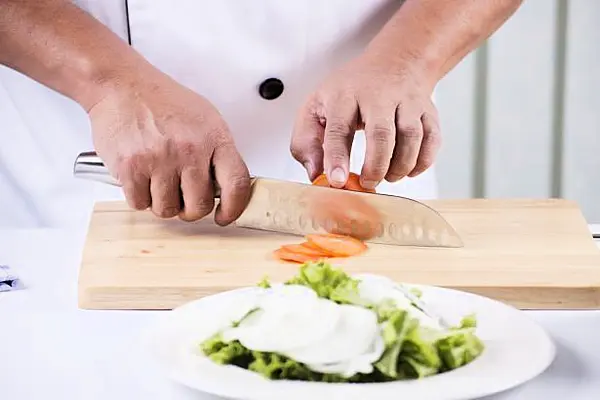Gordon Ramsay, Tom Kerridge and Clare Smyth are among the Michelin-starred British chefs who will cook alongside their New York counterpart Dan Barber when he opens a popup restaurant converting food waste into £15 ($18) sharing dishes and £32 high tea.
Barber is also recruiting other big names from the UK and Europe. There's just one catch: Diners won't know in advance who is the guest chef on the day they book at the rooftop site at Selfridges department store in London.
People wait months for a table at Blue Hill at Stone Barns, in upstate New York, where Barber serves a vegetable-led menu with ingredients from his farm. It was named best restaurant in America 2016. This will be his first venture in the UK.
The popup, to be called wastED London, runs from Feb. 24 to April 2, serving menus designed to raise awareness of food waste. Expect quirky dishes with skin and bones and other ingredients you wouldn't normally expect.
The original wasteED was a popup in New York two years ago. Multi-Michelin starred Alain Ducasse was among guest chefs—Barber is a hero in the culinary world—but the food was a world away from fine dining, featuring bits of meat, fruit, vegetables and fish you'd normally chuck away.
While Ramsay is fiery, Barber is softly spoken and thoughtful. Smyth will open her own restaurant this year after leaving Ramsay's flagship, where she was custodian of his three Michelin stars since 2007. Kerridge is the only chef to hold two Michelin stars at a pub, the Hand & Flowers.
Barber said he looks forward to working with chefs and farmers to create the menu. He cited the British bubble and squeak—made with leftovers such as cabbage and potato—as an inspiration.
"It's all very exciting," Barber said in an interview at Blue Hill at Stone Barns. "To put together a menu in a different city is to be forced to learn about its history and its agricultural realities. And the food scene in London is very vibrant."
It will be an a la carte menu for lunch and dinner. Expect some surprises: In New York, the menu featured kale ribs, bruised vegetables and fruits, fish heads and stale bread, according to Eater.com.
Barber is also creating a "Not So Customary" afternoon tea. Details haven't been announced but it's a fair bet it won't be like the Ritz.
Expect tables to be hard to get. When French chef Pierre Koffmann came out of retirement to open on the roof of Selfridges in 2009, he sold out immediately. The run was extended three times. Tickets were also snapped up for Thomas Keller's French Laundry at Harrods in 2011 and for Rene Redzepi's Noma at Claridge's in 2012.
Unusual menus are no hindrance. One of Redzepi's dishes featured live ants.
“What we are doing is a new way of looking at farming—eating the entirety of the farm in the same way that we have nose-to-tail eating of the animal”
Barber is a leader of the farm-to-table cooking movement, where chefs work with local producers and use the freshest organic ingredients in menus that promote sustainable agriculture and highlight individual farmers and fishermen. But he says such ideas don't go far enough in combating food waste.
"It's too passive," he says. "It allows you to dictate the menu by purchasing what you want from a farm. You end up treating it like a supermarket. I don't reject the term farm to table - I own a restaurant on a farm, so I'd better be careful - but it's too easy.
"I am in favor of expanding the definition of what is waste food. We get to choose what's for dinner when really we need a pattern of eating that supports a landscape."
Barber says he's optimistic, pointing to other recent food trends.
"Increasingly, when you go to top restaurants around the world, the carrying card for those restaurants is not lobster, caviar, foie gras anymore," he says. "It is ingredients that speak to place, to an agricultural history that is part of the culture.
"What we are doing is a new way of looking at farming—eating the entirety of the farm in the same way that we have nose-to-tail eating of the animal that you all in England exported to the rest of the world. What I like about London is the openness to these ideas. The culture around food waste is fantastic—way ahead of America's."
Article by Richard Vines, chief food critic at Bloomberg.









